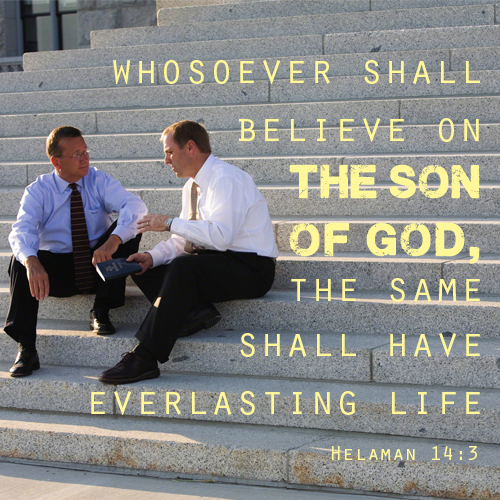2 Nephi, in the Book of Mormon, is a difficult chapter for many people to read. However, it is filled with valuable teachings about Jesus Christ and is an essential read for those who want to understand Mormon doctrines about the Lord Jesus Christ. Mormon is a nickname some people use when talking about the Mormon people, although it should not be used as the name of the Church.
 In this book, the prophet Nephi and his brother Jacob are teaching the people. Nephi took as his text the prophecies of the Biblical Isaiah. The people of the book of Mormon took with them to their new homeland somewhere in the Americas the Jewish scriptures that were available in 600 BC, when they left Jerusalem. However, in ancient times, many people could not read. The scriptures had to be read to them by their leaders. Nephi quoted extensively from Isaiah, although the translation here differs somewhat from the King James translation. He also explained many of the scriptures to his people, helping them to understand that they, as descendants of the Jews, were recipients of the promises made to the Jews.
In this book, the prophet Nephi and his brother Jacob are teaching the people. Nephi took as his text the prophecies of the Biblical Isaiah. The people of the book of Mormon took with them to their new homeland somewhere in the Americas the Jewish scriptures that were available in 600 BC, when they left Jerusalem. However, in ancient times, many people could not read. The scriptures had to be read to them by their leaders. Nephi quoted extensively from Isaiah, although the translation here differs somewhat from the King James translation. He also explained many of the scriptures to his people, helping them to understand that they, as descendants of the Jews, were recipients of the promises made to the Jews.
When he finished teaching from the book of Isaiah, he began to speak directly about Jesus Christ. 2 Nephi 25 explains the purpose of the Book of Mormon and the goal of modern Mormons. It helps to clarify some essential beliefs, many of which are misunderstood by people who don’t have been incorrectly taught what Mormons believe. After explaining that Jesus Christ would come to the earth in the future, he says, in verse 23:
For we labor diligently to write, to persuade our children, and also our brethren, to believe in Christ, and to be reconciled to God; for we know that it is by grace that we are saved, after all we can do.
Many people are surprised to learn the Book of Mormon teaches the doctrine of grace. This is explained in previous articles, but briefly, Mormons do believe we are saved by grace. It would be impossible for anyone to save himself, no matter how carefully and correctly he lived his life. We are not capable of perfection and so our sins must be paid for by someone who lived a sinless life, came to earth to atone for our sins voluntarily, and was half divine (though His heritage as God’s son) and half mortal (through his mother’s heritage). Only Jesus Christ could fulfill these requirements. Had He rejected His mission, we would have been doomed.
Through His atonement, all rise from the dead. This gift is given freely to everyone, regardless of behavior or belief. Other portions require activation. Even those who say they don’t believe in works actually generally do, since they believe you are only saved if you accept Jesus Christ as your Savior—and that, obviously, is a work. Repentance also requires actions. Many also follow the Biblical teaching that you must be baptized, also a work. The real question, then isn’t whether or not Mormons believe in works, since all Christians do, but how many works and how they are applied to eternity.
Mormons believe that although our works don’t save us, they are evidence of our faith. Mormons believe that Nephi’s admonition that we are saved by grace after all we can do includes repentance, baptism, and enduring to the end. This last piece refers to continuing to have faith and to keep the commandments of Jesus Christ. After all, how can we call ourselves followers of Christ if we don’t do the things He taught us to do?
Near the end of the Book of Mormon, a prophet named Moroni taught, “Yea, come unto Christ, and be perfected in him, and deny yourselves of all ungodliness, and love God with all your might, mind, and strength, then is his grace sufficient for you, that by his grace ye may be perfect in Christ (Moroni 10:32).
In other words, we have to demonstrate that we really have accepted Jesus Christ as our Savior. Parroting words we don’t really mean will have no impact on our salvation. Being saved, for Mormons, is an eternal process. In fact, many Christians are beginning to question the idea that just saying the words once is not enough. “Once saved, always saved” seems to be a license to sin and also makes it too easy to simply forget about God. Once some people have accepted Jesus Christ as their Savior, they figure their work is done and they can now live their life any way they choose, seldom even thinking of God.
Clearly this is not what our most wise Heavenly Father had in mind. He would not create a system that gave us permission to forget Him. Being saved, then, is possible only through grace, but we must then honor our commitment to Jesus Christ by following in His footsteps.
The next portion of this chapter cover rejoicing in the Savior and will be discussed in the next article.
About Terrie Lynn Bittner
The late Terrie Lynn Bittner—beloved wife, mother, grandmother, and friend—was the author of two homeschooling books and numerous articles, including several that appeared in Latter-day Saint magazines. She became a member of the Church at the age of 17 and began sharing her faith online in 1992.





Great post Terri Lynn. Have you read or listened to Brad Wilcox’s talk about this on BYU Speeches? You would love it. http://speeches.byu.edu/?act=viewitem&id=1966